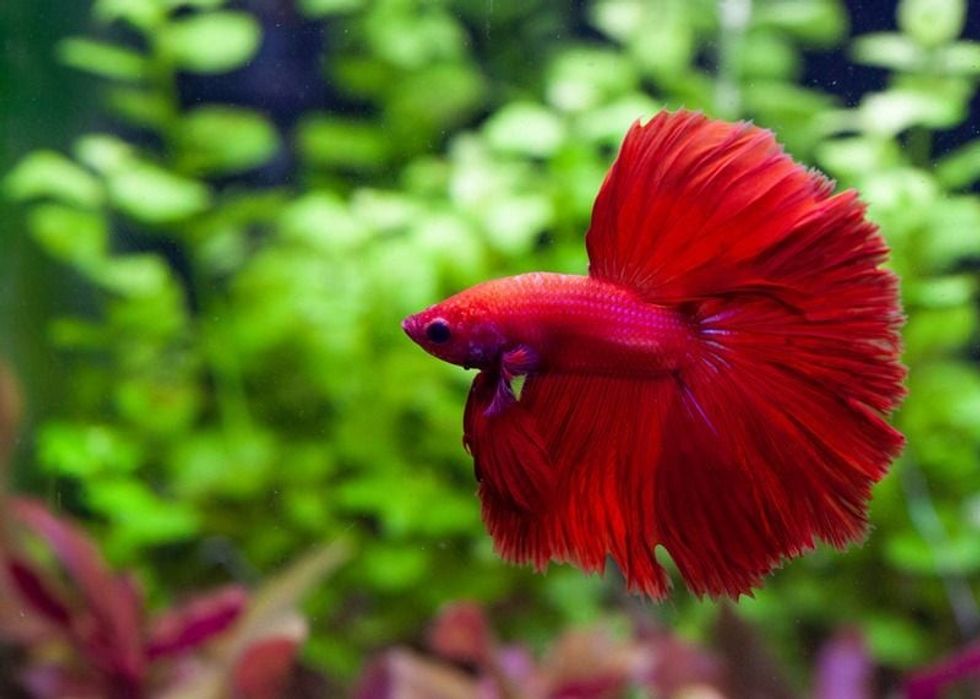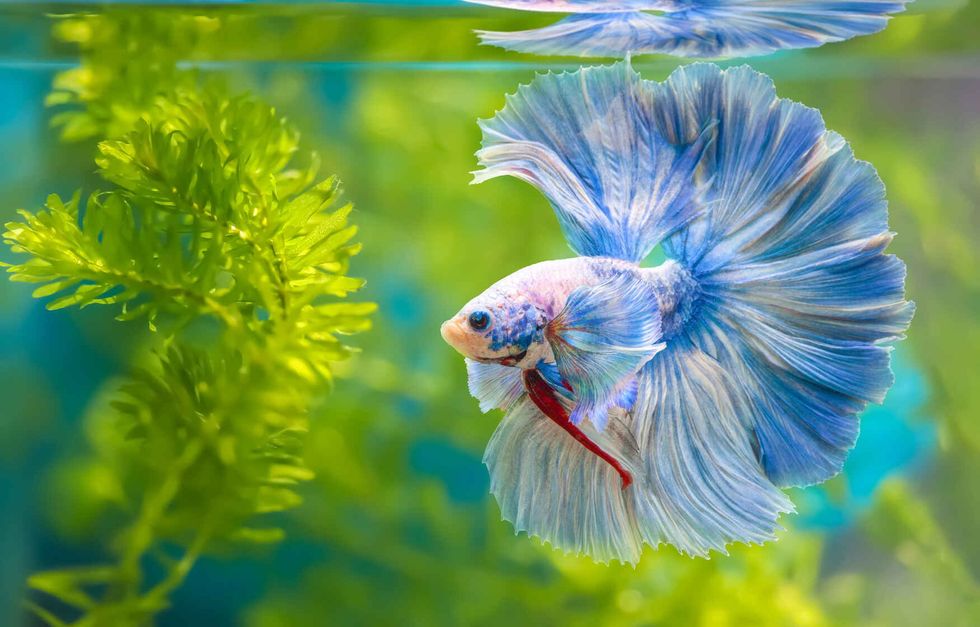Bloated Betta: Learn How To Keep Your Betta Fish's Dropsy At Bay!

Fish care, especially for beginners, can be a difficult task.
There are a variety of health issues that might hurt your fish. Betta fish are a tougher option, but they, too, may become ill with certain diseases.
Some betta fish have a weak immune system, which some attribute to reproduction. As the desire for more vibrantly colored Bettas grows, fish pairings are becoming increasingly common in bettas, which may result in genetic deficits.
That explains why some fish are prone to being ill. Flaring is a form of harassment that is used to demonstrate authority and make one look larger.
Bettas can engage in this behavior for a few minutes each day, but much longer than that can result in stress in fish. To prepare food for bettas, blanch one pea by submerging it in hot water for a few seconds to soften it.
Cook for 30 seconds for fresh peas or one minute for frozen peas, then remove and chill in ice-cold water. Remove the skin and give the betta a little part of the interior.
Low salt levels in the water help the fish maintain their osmotic balance by bringing the water salinity closer to the fish's blood salinity.
This aids the fish in getting rid of excess water in their bodies, which causes dropsy. However, don't use too much Epsom salt, as it might be harmful to this freshwater fish.
What is bloat in betta fish?
Bloat is one of the most prevalent health issues in betta fish. A bloated betta's tummy will seem enlarged and projecting.
Bloat can harm the fish along one or both sides, making him look asymmetrical at times. A swelling tummy in a female betta fish might show a sign that it is egg-bound. The male betta fish will put the eggs in some kind of bubble nest.
Fish that have a bloated stomach may struggle to swim and become stuck at the top of the water or at the bottom of the tank. Because betta fish need to surface regularly to breathe, this is quite harmful.
It might be perplexing to witness your betta fish change from healthy and active to bloated and uninterested.
There might be various reasons why your Betta fish has a swelling on the tummy and looks sleepy. But no need to fear because swelling on the abdomen doesn't always signal that your pet fish is in danger.
Swelling in the abdomen might indicate mild constipation rather than the potentially catastrophic Dropsy or the bothersome swim bladder disorder. Due to overfeeding with nutrient-dense meals or a lack of fiber in its poor diet, a Betta fish may acquire a swelling in the tummy.
Bloat in fish can also be caused by poor water quality, bacterial diseases, or internal parasites.
Constipation is the most common cause of bloat in betta fish. Constipation is incredibly easy to treat and avoid, so despite the fact that the ailment appears to be serious, you shouldn't be too concerned about your fishy pal, as you'll most likely be able to heal him rather quickly.
Constipation is the most prevalent cause of bloat in bettas, followed by swim bladder illness and, tragically, dropsy. If your betta possesses the first two, it should be able to recover quickly from constipation.
However, if a betta fish has dropsy, its chances of survival are much smaller. Diagnosis and treatment for constipation in your betta fish are surprisingly simple.
Fortunately, this is the most prevalent cause of bloat in bettas, so your betta is likely to be affected by constipation. In addition to a bloated belly, the sign of constipation can be identified by the following betta symptoms:
Bloat and stringy feces are the two most obvious symptoms of constipation in your betta.
Poor Appetite: Bettas are extremely hungry fish. If the constipated fish isn't eating as much as it typically does, you'll notice right away.
Less Waste: The constipated betta won't be able to pass excrement if it is constipated.
Swimming and breathing difficulties are sometimes a part of the illness.
All of these variables may cause an extension of the abdomen in betta fish, resulting in a bloat belly. Severe constipation, as well as disorders like swim bladder disorder or dropsy, are all possible side effects. All of these illnesses can be healed if they are detected correctly and in a timely manner.
Can dropsy in betta fish be cured?
The infection that causes dropsy is difficult to treat. To prevent the virus from spreading to healthy fish, some specialists propose killing all afflicted fish. One of the most dangerous diseases that can affect betta fish is dropsy. Bettafix may help you get rid of dropsy, but there's no way to know for sure.
Dropsy is a bacterial infection that can develop in the fish rather than as a sickness. This is a very frequent sickness that is quite easy to detect if you study the symptoms and watch your fish correctly.
Dropsy may drastically limit the life of your fish if you do not treat it early. The name 'dropsy' refers to a disorder in which fish have massively inflated bellies, and it is named so likely due to how exactly it describes the visual symptom: the belly drops down.
The bacterium gradually penetrates a fish's scales. It affects the betta's kidneys and liver and causes its body to retain excessive quantities of fluid.
The accumulation of fluid makes the fish uncomfortable, causing them to lose typical activities such as eating and energetic swimming.
Dropsy will change your betta's appearance. You may notice that your Betta's scales are jutting out in an unusual way, like a pinecone.
The fish will also appear swollen and larger than it was only a few days ago. You may also notice that they get bug-eyed or that their eyes shoot out like betta Popeye.
Your betta's gills will turn pale and lose their color. Due to the unusual shape of the body caused by bloat, spine curvature is also prevalent.
In terms of activity, the fish will begin to float rather than swim. They will stop eating or simply consume a small portion of their meal.
It's also possible that their droppings may be discolored or that they will stop swimming at the top of the tank. As the infection advances, these symptoms will intensify, and the fluid retention will change the body of your fish. Fluids will gradually push your fish's organs to the side, causing anemia.
If any of these symptoms appear, therapy should be started right away. That would save the fish's life.
Poor water quality or a dirty environment is the most prevalent cause of dropsy. Another typical cause is an unstable water temperature, which can be caused by your fish being kept in a chilly setting. Other plausible reasons include irritating factors such as aggressive tank mates.
The immune system of your betta fish may be damaged as a result of a poor diet and stress. Finally, long-term transit can cause dropsy, which is why it's so common in fish imported from pet stores.
Dropsy is a difficult-to-treat illness with which many fish specialists disagree. Despite this, there are very few things you can do as a treatment for your fish from Dropsy, especially if you catch it in the initial stage.
To begin with, take your betta out of the contaminated water, particularly if they share a tank with other tank mates. To safely transfer them, construct a hospital tank with clean water—consider using Epsom salt or aquarium salt baths for the betta fish.
To help sterilize the water, it is advised that you use one teaspoon of Epsom salt per gal (3.7 l) of water. Start feeding your betta fish high-nutrient items after that.
If the infection is still in its early stages, good food may be enough to keep your betta at a safe level.
If your fish doesn't seem to be getting better, you'll have to resort to medicine. Dropsy can be treated with an antibiotic that kills all gram-negative bacteria.
Most medicines can heal your fish in a week if taken correctly. To guarantee that the infection is gone, most fish experts recommend treating the fish for up to 10 days.

How do you cure swim bladder disease in betta fish?
If an enlarged belly or intestine is reported to induce swim bladder disease, the first step for treatment is to stop feeding the fish for three days. At the same time, increase the water temperature to 78-80 F (25-26 C) and keep it there during the treatment.
The swim bladder disease can be transitory or permanent, depending on the etiology. If your fish has a lifelong swim bladder problem, several lifestyle changes can help them live a full and happy life.
Swim bladder dysfunction is a condition in which the swim bladder does not function correctly as a result of illness, physical anomalies, mechanical/environmental problems, or unknown causes.
Damaged fish will have difficulties managing their abilities to swim or sink, causing them to float or sink. Fish with swim bladder problems show a range of buoyancy-related symptoms, such as sinking to the bottom or rising to the top of the tank, floating upside down or on their sides, or straining to maintain a normal posture.
Physical symptoms such as a bloated belly or a bent back may also be evident.
Betta fish that have been affected may show a sign of consuming live food regularly or not at all. If the betta fish has serious buoyancy issues, they may not be able to eat regularly or even reach the water's top.
A swollen stomach from quick feeding, constipation, overeating, or slurping air, which is theorized to occur with floating meals, can be caused by the contraction of the swim bladder in betta. Consuming freeze-dried or granular flake food that expands when wet can also cause an enlarged abdomen or digestive tract.
Coldwater slows digestion, which can result in gastrointestinal tract edema and pressure on the swim bladder.
The swim bladder might fail due to the expansion of other inner organs. In female fish, cysts in the kidneys, fatty liver accumulation, and egg attachment can all create enough expansion to harm the swim bladder.
Inflammation of the swim bladder can also be caused by parasites or bacterial infections.
The swim bladder disease can be damaged by a forceful blow from striking an object in the tank, a battle, or a fall. Rarely are fish born with congenital abnormalities that impair the swim bladder, although symptoms normally appear at a young age in these circumstances.
The sort of therapy you'll require is mostly determined by the common cause of your swim bladder illness. If you have an isolation tank on hand, it's usually a good idea to shift your betta into it.
As a result, you can treat it without having to worry about medicating your other fish or plants.
Treatment with a broad-spectrum antibiotic may assist if an infection is suspected as the reason for a fish's swim bladder issue, and you'll have to see your veterinarian for this. Other therapies that can help betta fish (independent of the reason) include: Keeping the water quality clean and between 78-80 F (24-25 C) is essential.
A modest amount of aquarium salt can be added to the tank. Reduce the water level in the tank to make it easier for the fish to move about.
Water flow in tanks with a high current is being reduced.
If the afflicted fish swims with a section of its body exposed to the air all of the time, a small amount of stress coat applied to the exposed area may help prevent the formation of sores. If the fish has substantial mobility problems, hand feeding may be essential.
Can overfeeding betta fish cause dropsy?
Overfeeding or improperly providing food to fish can be detrimental because of the risk of bloat, a condition that will almost always result in the death of the fish. Bloat is caused by bacterial, viral, protozoal, or parasitic illnesses and is sometimes known as dropsy.
You should only feed your betta twice a day if you have one.
Because a betta's stomach is the same size as its eyeball, it's quite easy to overfeed them. Not only may overfeeding cause your betta to enlarge and bloat, but it can also cause leftover food to decay in the tank.
One of the symptoms causes constipation rather than dropsy, which is a more prevalent Betta fish ailment.
Constipation in betta can also be caused by fish not consuming live food, such as that which is too dry (beware of the cheap fish pellets sold in pet stores) or has too much protein.
When too much bacteria in the environment causes dropsy, it signifies two things: first, your betta fish's immune system has been damaged (most often due to stress or food-related issues), and second, your fish's surroundings are filthy.
As a result, before handling fish, fishnets, tank water, aquarium decorations, or anything else that may come into contact with your fish, wash your hands first. Overfeeding does not always result in dropsy, but it might cause your fish to defecate more, causing your tank's ammonia levels to increase more quickly.
Remember that one of the symptoms causes of the different disorders that lead to dropsy is contaminated water quality.
Obesity is one of these disorders. Betta fish can, in fact, get obese. Avoid buying the inexpensive pet pellets sold in many pet stores since they contain fillers like oats.
Betta fish aren't intended to eat stuff like this. They form fat in the fish's body when stimulated because they are not metabolized properly.
If you think you're feeding your betta too much, try starving it once a week. If your betta is already bloated, I recommend giving it a frozen pea to assist the fish in emptying its system. For a few days, don't feed your betta anything.
We Want Your Photos!
More for You
See All
Master of Computer Science

Abhijeet ModiMaster of Computer Science
An experienced and innovative entrepreneur and creative writer, Abhijeet holds a Bachelor's and Master's degree in Computer Application from Birla Institute of Technology, Jaipur. He co-founded an e-commerce website while developing his skills in content writing, making him an expert in creating blog posts, website content, product descriptions, landing pages, and editing articles. Passionate about pushing his limits, Abhijeet brings both technical expertise and creative flair to his work.
Disclaimer
1) Kidadl is independent and to make our service free to you the reader we are supported by advertising. We hope you love our recommendations for products and services! What we suggest is selected independently by the Kidadl team. If you purchase using the Buy Now button we may earn a small commission. This does not influence our choices. Prices are correct and items are available at the time the article was published but we cannot guarantee that on the time of reading. Please note that Kidadl is a participant in the Amazon Services LLC Associates Program, an affiliate advertising program designed to provide a means for sites to earn advertising fees by advertising and linking to Amazon. We also link to other websites, but are not responsible for their content.
2) At Kidadl, we strive to recommend the very best activities and events. We will always aim to give you accurate information at the date of publication - however, information does change, so it’s important you do your own research, double-check and make the decision that is right for your family. We recognise that not all activities and ideas are appropriate for all children and families or in all circumstances. Our recommended activities are based on age but these are a guide. We recommend that these ideas are used as inspiration, that ideas are undertaken with appropriate adult supervision, and that each adult uses their own discretion and knowledge of their children to consider the safety and suitability. Kidadl cannot accept liability for the execution of these ideas, and parental supervision is advised at all times, as safety is paramount. Anyone using the information provided by Kidadl does so at their own risk and we can not accept liability if things go wrong.
3) Because we are an educational resource, we have quotes and facts about a range of historical and modern figures. We do not endorse the actions of or rhetoric of all the people included in these collections, but we think they are important for growing minds to learn about under the guidance of parents or guardians.







